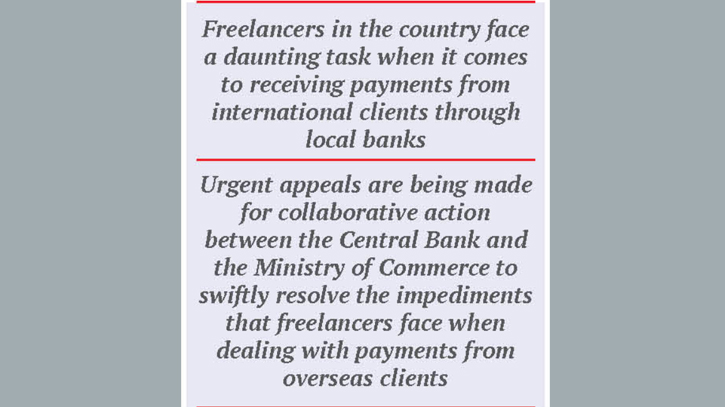
Photo : Messenger
Freelancers in the country face a daunting task when it comes to receiving payments from international clients through local banks. Urgent appeals are being made for collaborative action between the Central Bank and the Ministry of Commerce to swiftly resolve the impediments that freelancers face when dealing with payments from overseas clients.
Freelancers in the country are grappling with substantial hurdles when it comes to accessing their hard-earned earnings from international clients through local banks.
This issue has raised widespread concern among various stakeholders, prompting urgent calls for a collaborative effort between the Central Bank and the Ministry of Commerce to swiftly address the challenges.
Experts contend that streamlining the payment process for freelancers would not only alleviate their difficulties but also potentially bolster the nation's foreign exchange reserves and contribute to mitigating the ongoing dollar crisis.
It's worth noting that approximately one million freelancers operate within the country, engaged in a diverse array of services, including graphic design, serving clients in as many as 253 global markets.
Nevertheless, these freelancers encounter added costs when bringing their earnings back to the country due to the absence of a PayPal service, with the expense of transferring money through international gateways surging by as much as $10 per transaction. Furthermore, many freelancers encounter difficulties in securing essential bank loans, compounding their financial struggles.
Rajib Ahmed, a freelancer, expressed his frustration when speaking to The Daily Messenger, saying, "Individuals often embark on freelancing without realising the ensuing challenges. They end up wasting a significant amount of time shuttling between various bureaucratic requirements. The frustration peaks when you realise that despite completing work online, the funds do not flow directly into your account."
He continued, "Regrettably, our country has yet to authorise direct transfers from PayPal to Bangladeshi accounts, making the banking process even more convoluted, with banks frequently demanding a multitude of documents. Freelancers are being subjected to various forms of harassment."
When approached for comments, Mustafa Kamal, Additional Secretary of the Information Technology Department, shared insights, stating, "Efforts are underway to develop intellectual property protection policies aimed at facilitating freelancer transactions. Bangladesh Bank and the Ministry of Finance are collaborating across various sectors.”
“A resolution is anticipated in the near future, and we are committed to enabling freelancers to seamlessly transfer their hard-earned income and foreign remittances into their bank accounts," added the official.
According to the Oxford Internet Institute's Online Labour Index, Bangladesh maintains a formidable position in the global landscape of ICT freelancing services. Millions of Bangladeshi freelancers actively contribute to this sector on a worldwide scale, infusing millions of dollars into the country's economy annually. Consequently, Bangladesh stands as one of the world's premier countries for freelance income.
As reported by the Freelancers Association, freelancers in the country garnered over a billion dollars in earnings last year, and within the initial nine months of this year, they've amassed one and a half billion dollars. With hopes of reaching the two-billion-dollar mark by year-end, the potential of this sector remains significant.
In this context, Junaid Ahmed Palak, the State Minister of the Information and Communication Technology Ministry, shared his vision with The Daily Messenger, saying, "Currently, there are approximately 650,000 freelancers in the country generating one and a half billion dollars in earnings. By 2025, we anticipate the creation of an additional 1 million freelancers, propelling the total income to surpass 5 billion dollars."
He also underscored the role of today's 50 million students, highlighting their potential as the future leaders of a technologically advanced Bangladesh by 2041. The government has implemented a range of initiatives to enhance their competence and efficiency, including widespread access to high-speed internet. These students are expected to transition from job seekers to job providers, contributing to remittances, making it vital for them to harness the opportunities facilitated by the government.
Messenger/Sanjay/Disha








